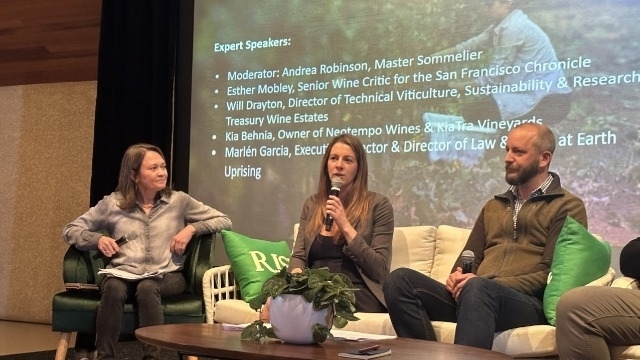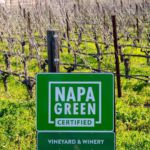"Plant Based and Climate Friendly": SF Chronicle's Esther Mobley Tells Wineries to Woo Younger Consumers with Green Messaging
- Pam Strayer | wine business |
- April 24, 2023
Esther Mobley, senior wine critic at the San Francisco Chronicle, told a St. Helena audience Thursday that the wine industry should message wine’s climate friendly benefits in order to reach Gen Z and Millennial consumers.
Speaking at the final session of Napa Green’s sustainability summit, she said, “The opportunity is to reposition wine as a product that can stand up to climate change, that can maybe mitigate some of its effects. And then, ultimately, it can help us understand the earth better.”
Mobley said consumers “are oblivious” to the fact that wine is agriculture. “Their frame of reference just kind of ends at the supermarket shelf,” she said.
“Many of you in this room are probably here, because you care about the environment, just because it’s the right thing to do…and that’s great,” she said. “But for any of this to work, ultimately, of course, it has to make business sense.”
“I want to make the argument here that it’s really good PR and especially great PR with a cohort of customers that I know many of you would so love to cultivate, which is young people.”
“I won’t go into the basics about how millennials and Gen Z aren’t drinking enough wine…I don’t need to take any time of your day reminding you of that. But I’ll mention a few things that are maybe a little less exhaustively researched in wine circles–which is that young people care really quite a lot about climate change.”
She quoted from a 2021 Pew Research study, that found that younger generations are more motivated by climate issues than their elders.
Sharing the study’s statistics, she noted, “Despite the fact that most forms of political engagement, like voting, are much higher among older people, political action, specifically related to climate change, is significantly higher among Gen Z [age 11-26] and Millennial folks [27-42] than among boomers and older than boomer adults.’
“…the younger someone is, the higher their anxiety is about climate change,” she said, adding that the survey showed “that 41% of Boomer and older generations express anxiety about climate change, compared to Gen X at 46%. Millennials are at 59%, while Gen Z are 69%.”
Party lines did not change the generational split, she said.
“One thing I found interesting was that these effects hold even when you control for political ideology. So Gen Z and Millennial Republicans and Republicans on the whole report less interest in climate change issues. But Gen Z and Millennial Republicans still said that climate change action should be prioritized in much higher shares than older generations of Republicans. These youngsters have ideas that their parents’ generation may not widely share.”
“So, for example, a majority of Gen Z and Millennial people favor the phase out of gasoline powered vehicles by the year 2035. And a majority of generations older oppose that. So, in other words, a customer base that I think the American wine industry so dearly loves has very clear, identifiable priorities and values. And that’s an opportunity.”
“And yet, I do not think, from where I’ve stood, that the wine industry has done an effective job of communicating where it stands on climate change.” She attributed that failing to division within the industry itself.
“What I am suggesting is that the industry as a whole needs to get its story straight,” she said. “You already have incredible infrastructure here, you have very well resourced organizations…[yet] for many casual wine drinkers, or would be wine drinkers, the link between a bottle of Cabernet on the shelf and questions like carbon sequestration are not immediately clear. …Now’s the time for you all to tell a story.”
“I don’t think people have a negative impression of wine, when it comes to climate change. Wine isn’t like Monsanto. I just don’t think people have much of an impression at all. So I think it’s time to make an impression,” she said.
In response to discussions about bottle weight, a metric many wineries are now focusing on to reduce their carbon emissions, Mobley said consumers don’t want big glass bottles. “They’re annoying to deal with,” she said. “And if you’re trying to transport them to dinner, they’re so obnoxious.” She said she doesn’t perceive a reluctance to embrace alternative packaging.
“Wine isn’t like Monsanto. I just don’t think people have much of an impression at all. So I think it’s time to make an impression,” she said.
Mobley shared some of the challenges she’s asked to balance in writing about climate change in her own work.
“One really sad moment for me in the last year of my life is that we have this audience team at the Chronicle that’s in charge of figuring out how to get more people to read our stories. And they said, ‘You have climate changes in two major headlines, Esther. And it’s like a downer day.’”
“So we’re coming up with different ways in the headline to get people to read about this stuff…I think you do have to kind of make it fun and playful or like sexy in a way.”
She said she looks for stories that demonstrate how the industry is adapting to climate change and other issues.
“What I find interesting is trying to talk to people about what are the kind of specific challenges they face in their sites and in their microclimates. And that can often open up interesting stories to me. Let me know if any of you have. If there’s some unique disease pressure, or some unique kind of climate phenomenon you’re experiencing, and you’re finding some way to kind of combat that and mitigate that, whether it’s with something you’re codifying through certification or not, that I think becomes really interesting and helps me understand how the California wine industry is facing climate change, and how California is facing climate change, which is what I’m ultimately interested in.
Mobley said that helping consumers shop their climate change values is a long term proposition.
“Think about how ‘organic wine’ used to be this really weird thing that people have this really bad impression of. don’t think that’s true anymore. I don’t think people associate it with weird wine anymore. And I think that’s happened maybe over the course of like 15 years.”
“And I think the same can be true of a lot of this stuff. I think people somehow over time when people think about Napa, when people think about wine, people think about California wine, they need to imagine a lush, biologically diverse ecosystem that needs to be the underlying association with it. I don’t think you do that overnight.”
“It’s in the small ways that you all talk to your customers, the ways you present your wines when people come to visit you, the message that your packaging sends when it goes out into the world and into restaurants. And it’s a kind of incremental effect.”
“I know that you all have neighbors out there who just can’t really see how climate change friendly farming is going to work with their vineyard yields, who fear that moving to lightweight glass bottles is going to diminish their customers’ perceptions of their wines,” she said, adding a warning “that the surviving generations of customers just won’t want to buy your product if you don’t align yourself with their values.”
“The point is that wine doesn’t have to change to adapt to what the market wants. It already is what people want. And it’s only the fault of the industry for not communicating that effectively.”
Making the commitment to third party certification takes time and effort, but it is worth it to demonstrate our commitment to the community and to protect our watershed, our land and the air we breathe.
- Susan Boswell, Chateau Boswell Winery



